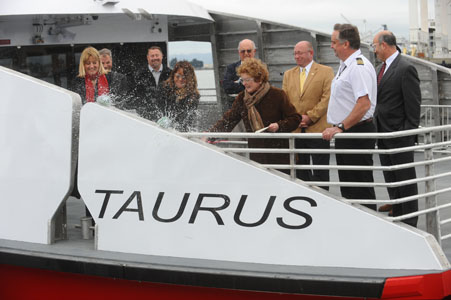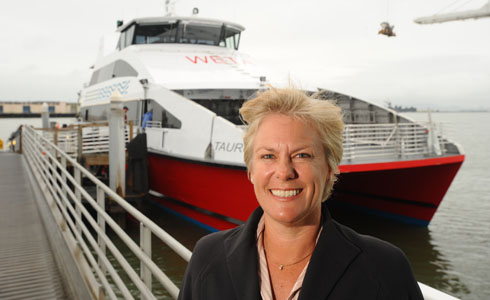In May, Congresswoman Barbara Lee joined CalEMA Secretary Matthew Bettenhausen, Bay Area Council President and CEO Jim Wunderman, Speaker pro Tempore and Assemblywoman Fiona Ma, Berkeley Mayor and Metropolitan Transportation Commissioner Tom Bates and Charlene Johnson, Chair of the Water Emergency Transportation Authority (WETA), to christen Taurus and welcome the public aboard the latest environmentally friendly vessel to join the Bay Area’s growing regional ferryboat system.

Taurus christened by Marina Secchitano, IBU and former WTA boardmember, Assemblywoman Ma, and WETA Chair Johnson. Photos by Noah Berger
“Expanding our regional ferry system is a key component in the Bay Area’s strategy to cut freeway congestion and provide sustainable transportation options in the San Francisco Bay Area,” Lee said.
“The investment we are making to build a robust regional ferry system today is essential to ensuring we are equipped to respond to natural disaster and other emergencies tomorrow,” Congressman John Garamendi added in a statement.
As part of the Bay Area’s growing regional ferryboat system, Taurus is WETA’s fourth new high-speed passenger boat, and an exceptionally green vessel. The 199-passenger, double-hulled catamaran vessel runs 85 percent cleaner than current EPA mandates for marine engines in this class. Taurus’ sleek, low-wake hull allows it to run more efficiently, thus reducing fuel consumption. The engine uses a biodiesel/ultra-low sulfur diesel fuel mix and is equipped with a catalytic reduction system—similar to the catalytic converter on an automobile—which drastically reduces the amount of emissions.
And the improvements aren’t just in engineering. The new boat provides comfortable seating on multiple interior and exterior levels for passengers, including booth and tables as well as lounge-style seating and weather deck areas. The vessel includes a multi-service bar with drinks and snacks, as well as wi-fi. These new vessels represent the initial investments in a regional ferry system with plans to add up to seven new routes that are expected to triple ridership.
“I am delighted to be here today for this important step forward in achieving Governor Schwarzenegger’s goal to ensure the safety of Californians. WETA’s work is important to prepare the Bay Area to respond and recover from man-made or natural disaster,” CalEMA Secretary Matthew Bettenhausen added.
CalEMA is responsible for leading the state’s emergency response to natural and man-made disasters. Service for WETA’s first new route, from Oakland to South San Francisco, links the East Bay to the Bay Area’s many biotech employers and is scheduled to begin in fall 2011. The additional boats will also increase WETA’s capacity to respond in the event of a regional emergency.
Environmental review and design work is also underway for new ferry routes linking Berkeley, Richmond, Hercules, Martinez, Antioch and Redwood City to downtown San Francisco.
“Many thanks to everyone who has been instrumental in helping WETA to bring a world-class regional ferry service to the Bay Area,” WETA Board of Directors Chair Charlene Haught Johnson added.
Bridge tolls approved by Bay Area voters in 2004 through Regional Measure 2 provide the primary source of funding for Taurus and WETA’s other newly-acquired ferries. Additional WETA funding comes from a variety of sources including the U.S. Department of Transportation Ferry Boat Discretionary Program, State Proposition 1B Transit Security Grant Program, Regional Measures 1 and 2, and county transportation sales tax measure funds approved in Alameda, Contra Costa and San Mateo counties.

WETA Executive Director Nina Rannells and Taurus. Photos by Noah Berger

